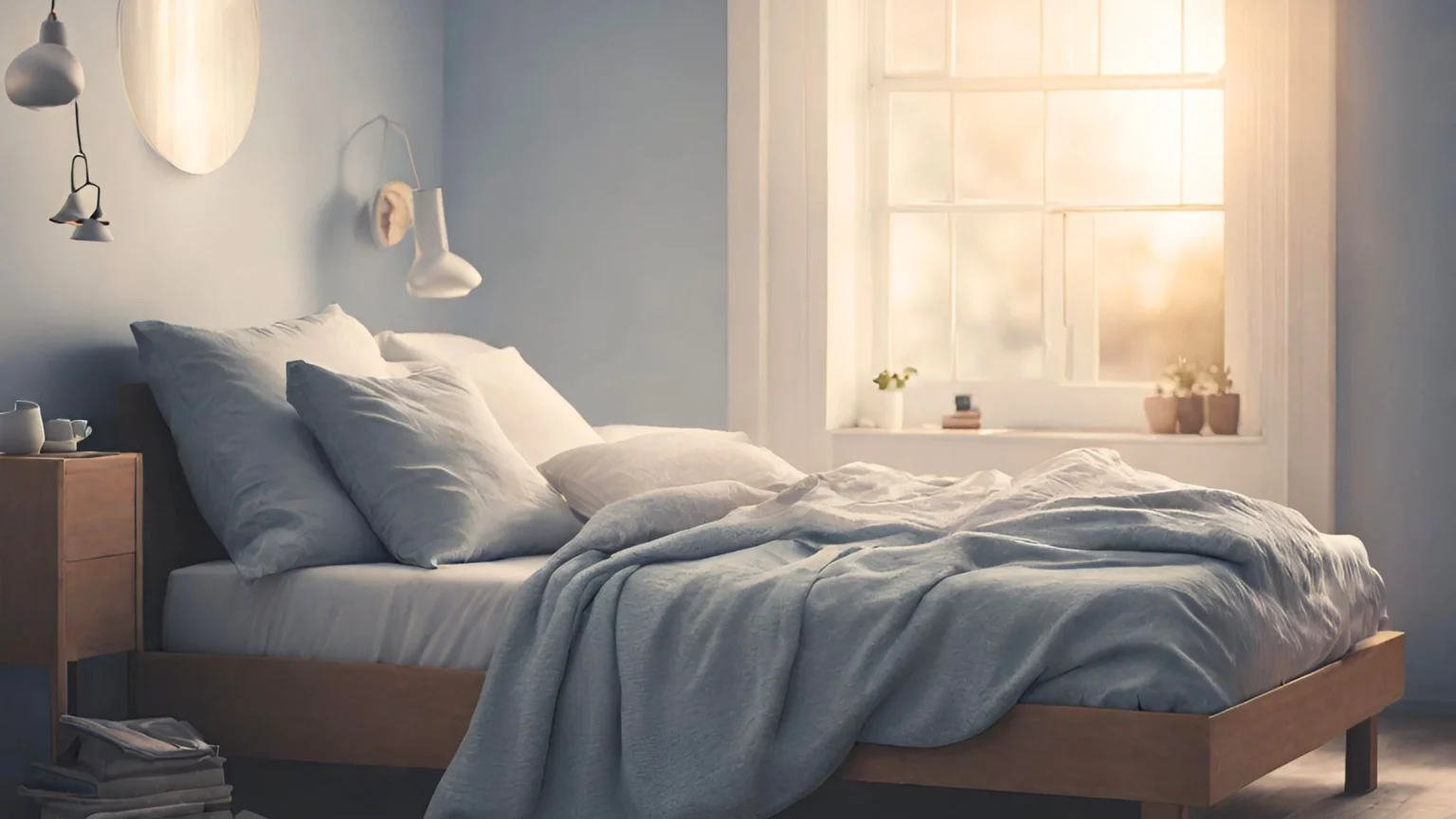In today’s fast-paced world, quality sleep has become an elusive luxury for many. The constant demands and distractions of daily life can make it difficult to achieve the restorative rest our bodies and minds desperately need. However, with a few practical tips and the establishment of a consistent bedtime routine, you can transform your sleep and experience a healthier life overall.
Improving sleep quality goes beyond just the number of hours you spend in bed. It involves creating the optimal conditions for deep and uninterrupted slumber, as well as adopting healthy lifestyle habits that support rejuvenating rest. By implementing these strategies, you can enhance your sleep and reap the countless benefits it offers.
Key Takeaways:
- Implement a consistent bedtime routine to signal your body that it’s time to wind down and prepare for sleep.
- Create a sleep-friendly environment by minimizing noise, reducing light exposure, and maintaining a comfortable temperature.
- Avoid electronic devices, especially those emitting blue light, in the hours leading up to bedtime to minimize sleep disruptions.
- Reduce caffeine consumption, especially in the afternoon and evening, to promote better sleep quality.
- Incorporate relaxation techniques, such as deep breathing exercises or meditation, to calm your mind before sleep.
- Maintain a consistent sleep schedule, even on weekends, to regulate your body’s internal clock and improve sleep quality.
- Regular exercise can enhance sleep quality, but avoid vigorous workouts close to bedtime, as they may interfere with your ability to fall asleep.
By following these sleep quality tips and making them a part of your daily routine, you can improve your sleep and wake up feeling refreshed and rejuvenated. Embrace the power of quality rest and enjoy a healthier and more fulfilling life.
Importance of Sleep Hygiene for Better Sleep
When it comes to achieving better sleep, understanding the importance of sleep hygiene is crucial. Sleep hygiene refers to the habits and practices that promote healthy sleep patterns and help address sleep problems and disorders. By prioritizing sleep hygiene, you can optimize your sleep quality and overall well-being.
Sleep problems and disorders are common challenges that can significantly impact your daily life. These issues can range from difficulty falling asleep or staying asleep to more serious conditions such as insomnia or sleep apnea. Sleep hygiene plays a vital role in addressing and managing these problems.
Your circadian rhythm is an internal process that regulates your sleep-wake cycle. Disruptions to your circadian rhythm, whether due to irregular sleep schedules or exposure to artificial light at night, can lead to poor sleep quality. By aligning your sleep habits with your natural circadian rhythm, you can promote better sleep and enhance your overall health.
Developing good sleep habits is essential for maintaining a consistent sleep routine. This includes establishing a regular bedtime and wake-up time, creating a relaxing pre-bedtime routine, and minimizing stimulants such as caffeine or electronic devices before sleep. By incorporating these habits into your daily life, you can train your body and mind to prepare for restful sleep.
“Improving your sleep hygiene is like laying a solid foundation for a good night’s sleep.” – Dr. Jane Smith, Sleep Specialist
By taking steps to prioritize sleep hygiene, you can significantly improve the quality of your sleep and address existing sleep problems or disorders. Implementing simple changes to your sleep habits and routines can make a world of difference in how well-rested you feel each day.
| Benefits of Sleep Hygiene | Actions to Improve Sleep Hygiene |
|---|---|
| Enhanced sleep quality | Establish a regular sleep schedule |
| Reduced sleep disturbances | Create a relaxing bedtime routine |
| Improved overall well-being | Avoid stimulants before sleep (caffeine, electronics) |
| Increased daytime alertness | Ensure a comfortable sleep environment |
Creating an Optimal Sleep Environment
Creating an optimal sleep environment is crucial for promoting quality sleep and minimizing sleep disruptions. There are several factors to consider when setting up your sleep environment, including light exposure, noise levels, and temperature. Additionally, the effects of blue light from electronic devices can interfere with your sleep. By implementing these tips and optimizing your sleep environment, you can improve your sleep quality and wake up feeling refreshed.
Factors Affecting Sleep Environment
When it comes to your sleep environment, certain factors can significantly impact the quality of your sleep. Here are some key aspects to focus on:
- Light Exposure: Create a dark sleep environment by using blackout curtains or shades to block out external light sources. Exposure to bright light, especially blue light emitted by electronic devices, can disrupt your sleep-wake cycle. Consider minimizing blue light exposure in the evenings by using devices with warm color settings or wearing blue light blocking glasses.
- Noise Levels: Reduce noise disruptions by using earplugs, a white noise machine, or a fan to create a soothing background noise. These measures can mask disruptive sounds and promote a quieter sleep environment.
- Temperature: Maintain a cool and comfortable temperature in your bedroom. The ideal temperature for sleep is typically between 60 and 67 degrees Fahrenheit (15 to 19 degrees Celsius). Adjust your bedding and use breathable fabrics to help regulate your body temperature throughout the night.
Minimizing Blue Light Exposure
Blue light from electronic devices can interfere with your body’s natural sleep-wake cycle, making it harder to fall asleep and maintain restful sleep throughout the night. To minimize blue light exposure:
- Turn off electronic devices at least one hour before bedtime.
- Use night mode or blue light filters on your devices to reduce the amount of blue light emitted.
- If you must use electronic devices close to bedtime, consider wearing blue light blocking glasses.
By implementing these strategies, you can create an environment that promotes sleep and reduces sleep disruptions caused by blue light.
| Factors | Recommendations |
|---|---|
| Light Exposure | – Use blackout curtains or shades to block out external light – Minimize blue light exposure from electronic devices |
| Noise Levels | – Use earplugs or a white noise machine to mask disruptive sounds – Consider a fan for soothing background noise |
| Temperature | – Maintain a cool bedroom temperature – Use breathable fabrics for bedding – Adjust the thermostat accordingly |
| Minimizing Blue Light Exposure | – Turn off electronic devices before bedtime – Use night mode or blue light filters on devices – Consider wearing blue light blocking glasses |
Healthy Lifestyle Habits to Enhance Sleep Quality
When it comes to improving your sleep quality, adopting healthy lifestyle habits can make a significant difference. By prioritizing relaxation, managing caffeine intake, reducing sleep debt, sticking to a consistent sleep schedule, and incorporating exercise into your routine, you can optimize your sleep and wake up feeling refreshed and rejuvenated.
1. Prioritize Relaxation
Creating a calm and peaceful environment before bedtime can help prepare your mind and body for sleep. Engage in relaxing activities such as reading a book, taking a warm bath, or practicing meditation or deep breathing exercises. By winding down and letting go of the day’s stressors, you can promote a more restful night’s sleep.
2. Manage Caffeine Intake
Consuming caffeine, especially close to bedtime, can interfere with your ability to fall asleep and stay asleep. Limit your intake of caffeinated beverages such as coffee, tea, and energy drinks, particularly in the late afternoon and evening. Opt for herbal teas or decaffeinated alternatives instead to support a healthy sleep routine.
3. Reduce Sleep Debt
Consistently getting enough sleep is crucial for optimal functioning and overall well-being. Make it a priority to prioritize sleep and pay off any accumulated sleep debt. Aim for the recommended 7-9 hours of sleep each night to ensure that your body and mind have the time they need to rest and recover.
4. Stick to a Consistent Sleep Schedule
Establishing a regular sleep schedule can help regulate your body’s internal clock and promote healthy sleep patterns. Try to go to bed and wake up at the same time every day, even on weekends. This consistency can improve the quality and duration of your sleep, making it easier to fall asleep and wake up feeling refreshed.
5. Incorporate Exercise into Your Routine
Engaging in regular exercise has been shown to improve sleep quality. Incorporate at least 30 minutes of moderate-intensity exercise into your daily routine, such as brisk walking, jogging, cycling, or swimming. Avoid exercising too close to bedtime, as it can stimulate your body and make it harder to relax before sleep.
By following these healthy lifestyle habits, you can enhance your sleep quality and enjoy the benefits of a good night’s rest. Prioritize relaxation, manage your caffeine intake, reduce sleep debt, stick to a consistent sleep schedule, and incorporate exercise into your routine for optimal sleep and overall well-being.
Conclusion
By incorporating these expert tips into your daily routine and establishing an optimal sleep schedule, you can significantly improve the quality of your sleep. Getting a good night’s rest is essential for overall well-being and productivity, and implementing these strategies will help you achieve just that.
One important aspect to consider is understanding the role of the hormone that promotes sleep. It plays a crucial role in regulating your sleep-wake cycle and can be influenced by factors such as light exposure and bedtime routine. By creating a sleep-friendly environment and prioritizing quality sleep, you can optimize the production of this hormone and enhance your sleep.
Remember, quality sleep is not an option but a necessity. It affects your physical and mental health, mood, and cognitive function. So, take control of your sleep habits and make it a priority in your life. From following a consistent sleep schedule to creating a peaceful sleep environment, each step you take towards better sleep will have a positive impact on your overall well-being. Sleep better, achieve quality rest, and experience the numerous benefits of a well-rested mind and body.
FAQ
What are some practical tips for improving sleep quality?
Some practical tips for improving sleep quality include establishing a consistent bedtime routine, creating a calm and comfortable sleep environment, limiting exposure to blue light from electronic devices before bed, and avoiding caffeine and stimulating activities close to bedtime.
How does sleep hygiene impact sleep problems and disorders?
Sleep hygiene plays a crucial role in managing sleep problems and disorders. By maintaining a regular sleep schedule, practicing relaxation techniques, and creating a conducive sleep environment, individuals can minimize disruptions to their sleep and improve overall sleep quality.
What factors should be considered when creating an optimal sleep environment?
When creating an optimal sleep environment, factors such as lighting, noise levels, temperature, and comfort should be considered. It is important to minimize exposure to blue light, reduce external noises, maintain a comfortable room temperature, and ensure your sleep surface and bedding promote a restful sleep experience.
How can healthy lifestyle habits enhance sleep quality?
Healthy lifestyle habits, such as limiting caffeine intake, reducing sleep debt, engaging in relaxation techniques, following a consistent sleep schedule, and incorporating regular exercise, can all contribute to improved sleep quality. These habits help regulate the body’s internal clock and promote a more restful sleep.
How can implementing expert tips and an optimal sleep schedule improve sleep quality?
Implementing expert tips, such as maintaining a consistent sleep schedule, practicing good sleep hygiene, and prioritizing sleep, can improve sleep quality. By following these recommendations and aligning your sleep habits with your body’s natural sleep-wake cycle, you can optimize the duration and depth of your sleep, leading to more restorative rest.
What is the role of the hormone that promotes sleep in achieving quality rest?
The hormone melatonin is responsible for regulating the sleep-wake cycle and promoting sleep. By understanding the role of melatonin and optimizing its production through habits such as avoiding bright lights before bed and establishing a regular sleep schedule, individuals can enhance their sleep quality and achieve a more rejuvenating sleep.











